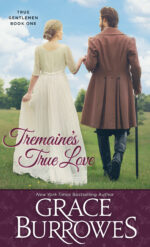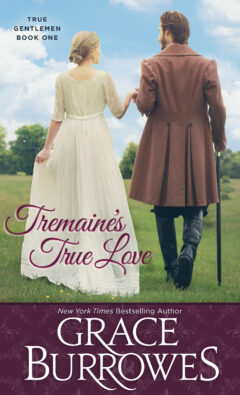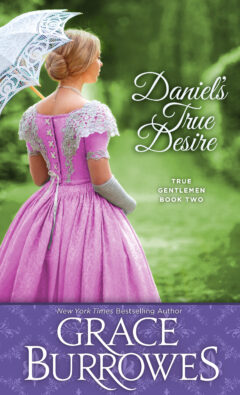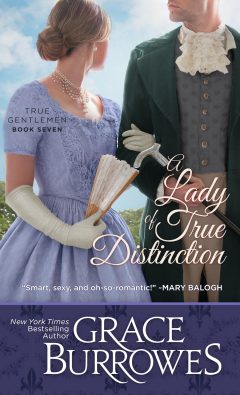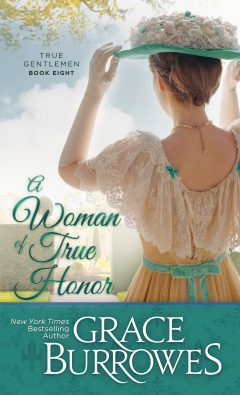Tremaine’s True Love
The True Gentlemen--Book One
Book 1 in the True Gentlemen series
Tremaine St. Michael is firmly in trade and seeks only to negotiate the sale of some fancy sheep with the Earl of Bellefonte. The earl’s sister, Lady Nita, is pragmatic, hard-working, and selfless, though Tremaine senses she’s also tired of her charitable obligations and envious of her siblings’ marital bliss.
Tremaine, having been raised among shepherds, can spot another lonely soul, no matter how easily she fools her own family. Neither Tremaine nor Nita is looking for love, but love comes looking for them.
Enjoy An Excerpt







Chapter One
“The greatest plague ever to bedevil mortal man, the greatest threat to his peace, the most fiendish source of undeserved humility is his sister, and spinster sisters are the worst of a bad lot.” In the corridor outside the formal parlor, Nicholas, Earl of Bellefonte, sounded very certain of his point.
“Of course, my lord,” somebody replied softly, “but my lord—”
“I tell you, Hanford,” the earl went on, “if it wouldn’t imperil certain personal masculine attributes which my countess holds dear, I’d turn Lady Nita right over my—”
“My lord, you have a visitor.”
Hanford’s pronouncement came off a little desperately, but had the effect of silencing his lordship’s lament. Quiet words were exchanged beyond the door, giving Tremaine St. Michael time to step away from the parlor’s cozy fireplace, where he’d been shamelessly warming a personal attribute of his own formerly frozen to the saddle.
Bellefonte’s greeting as he strode into the parlor a moment later was as enthusiastic as his ranting had been.
“Our very own Mr. St. Michael! You are early. This is not fashionable. In fact, were I not the soul of congeniality, I’d call it unsporting in the extreme.”
“Bellefonte.” Tremaine St. Michael bowed, for Bellefonte was his social superior, also one of few men whose height and brawn exceeded Tremaine’s.
“Don’t suppose you have any sisters?” Bellefonte asked, with a rueful smile. “I have four. They’re what my grandmother calls lively.”
So lively, Bellefonte had apparently bellowed at one of these sisters for the entire ten minutes Tremaine had been left to admire the spotless Turkey carpets in Belle Maison’s formal parlor. The sister’s responses had been inaudible, until an upstairs door had slammed.
“Liveliness is a fine quality in a young lady,” Tremaine said, because he was a guest in this house, and sociability was called for if he was to relieve Bellefonte of substantial assets.
His lordship was welcome to keep all four sisters, thank you very much.
“Fat lot you know,” Bellefonte retorted, taking a position with his back to the fire. “If every man in the House of Lords had rounded up his lively sisters and sent them to France, the Corsican would have been on bended knee, seeking asylum of old George in a week flat. How was your journey?”
Bellefonte had the blond hair and blue eyes of many an English aristocrat. The corners of those eyes crinkled agreeably, and he’d followed up Tremaine’s bow with a hearty handshake.
Bellefonte would never be a friend, but he was friendly.
“My journey was uneventful, if cold,” Tremaine said. “I apologize for making good time down from Town.”
“I apologize for complaining. I am blessed in my family, truly, but Lady Nita, my oldest sister, is particularly strong-willed.”
Bellefonte’s hearty bonhomie faded to a soft smile as feminine laughter rang out in the corridor.
“You were saying?” Tremaine prompted. When would his lordship offer a guest a damned drink?
“Nothing of any moment, St. Michael. My countess and my sister Della have taken note of your arrival. Shall we to the library, where the best libation and coziest hearth await? Beckman gave me to understand you’re not the tea and crumpets sort.”
When and why had his lordship’s brother conveyed that sentiment? Another thought intruded on Tremaine’s irritation: Bellefonte knew his womenfolk by their laughter. How odd was that?
“I’m the whiskey sort,” Tremaine said. “Winter ale wouldn’t go amiss either.” Not brandy, though. Not if Tremaine could avoid it.
His lordship was too well bred to raise an eyebrow at tastes refined in drovers’ inns the length of the realm.
“Whiskey, then. Hanford!”
A little old fellow in formal livery stepped into the library. “My lord?”
Bellefonte directed the butler to send ’round some decent sandwiches to the library, to fetch the countess to her husband’s side when the fiend in the nursery had turned loose of her, and to inform the housekeeper that Mr. St. Michael was on the premises earlier than planned.
His lordship set a smart pace down carpeted hallways, past bouquets of white hot house roses, and across gleaming parquet floors, to a high-ceilinged, oak-paneled treasury of books. Belle Maison was a well maintained example of the last century’s enthusiasm for the spacious country seat, and whoever had designed the house had had an eye for light.
The library was blessed with tall windows at regular intervals, and the red velvet draperies were caught back, despite the cold. Winter sunshine bounced cheerily off mirrors, brass, and silver and here too, the hearth was blazing extravagantly.
The entire impression—genial Lord Bellefonte; his dear, plaguey sisters; roaring fires in even empty rooms; the casual wealth lined up on the library’s endless sunny shelves—left Tremaine feeling out of place.
Tremaine had been in countless aristocratic family seats and more than a few castles and palaces. The out of place feeling he experienced at Belle Maison was the fault of the sisters, whom Bellefonte clearly loved and worried over.
Commerce, Tremaine comprehended and even gloried in.
Sisters had no part of commerce, but the lively variety could apparently transform an imposing family seat into a home. Bellefonte’s sisters inspired slammed doors, fraternal grumbling, and even laughter, and in this Belle Maison was a departure from Tremaine’s usual experience with titled English families.
“I know you only intended to stay for the weekend,” Bellefonte said, gesturing to a pair of chairs beneath a tall window, “but my countess declares that will not do. You are to visit for at least two weeks, so the neighbors may come by and inspect you. Don’t worry, I’ll warn you which ones have marriageable daughters—which is most of them—and my brother George will distract the young ladies.”
After the winter journey from Town, the cozy library and plush armchair were exquisitely comfortable. To Tremaine, who had vivid memories of Highland winters, comfortable was never a bad thing.
“A weekend might be all the time I can spare, my lord,” Tremaine said, seating himself in cushioned luxury. “The press of business waits for no man, and wasted time is often wasted money.”
“Protest is futile, no matter how sensible your arguments,” Bellefonte countered, folding his length into the second chair. “My countess has spoken, and my sisters will abet her. You are an eligible bachelor and therefore, a doomed man.”
The earl crossed long legs at the ankle, a fellow to whom doom was a merry concept.
“Her ladyship will ply you with delicacies at every meal,” he went on. “Kirsten will interrogate you about your business ventures, Susannah will discuss that Scottish poet fellow with you, and Della will catch you up on all the Town gossip. George be glad you’re on hand to distract our sisters. The Haddonfield womenfolk are like faeries. A man falls into their clutches and time ceases to have meaning.”
Avoid faeries as if your life depends on it. Tremaine’s Scottish grandfather had smacked that lesson into his hard little head before he’d been breeched.
“What about your sister Lady Nita?” Tremaine asked. The sister putting the worry and exasperation in her brother’s eyes, and inspiring the earl to raise his voice.
Tremaine would never approach an objective without reconnoitering first. Knowing who got on with whom often made the difference between closing a deal or watching the profits waltz into some other fellow’s pocket.
“Oh, her.” Bellefonte’s gaze went to the window, which looked out over terraced gardens in all their winter solemnity. Rose bushes were pruned back to knee height, so that only canes of thorny bracken remained. The shadows of the hedges harbored dirty snow, and not a single bird enlivened the scene.
A tall blond woman marched off toward the stables along a walk of crushed white shells. She wore a riding habit of dark blue—no clever hat or pheasant feather cocked over her ear—and her briskly swishing hems were muddy.
Bellefonte’s gaze followed the woman, his expression forlorn. “Lady Nita is very dear to me. She will be the death of us all.”
![]()
The baby was small and vigorously alive, two points in her favor—possibly the only two.
“Your mother is resting,” Nita said to the infant’s oldest sibling, “and this is your new sister. Does she have a name?”
Eleven-year-old Mary took the bundle from Nita’s arms. “Ma said a girl would be Annie Elizabeth. She wanted a boy though. Boys can do more work.”
“Boys also eat more, make more noise, and run off to become soldiers or worse,” Nita said. Boys became young wastrels who disported with the local soiled dove, heedless of the innocent life resulting from their pleasures, heedless that the soiled dove was a baronet’s granddaughter, and a squire’s daughter. “Have you had anything to eat today, Mary?”
“Bread.”
Thin and freckled, and wearing a dress that likely hadn’t been washed in weeks, Mary looked younger than her eleven years—also much, much older.
“Your mother will need more than bread to recover from this birth,” Nita said. “I’ve brought butter, sausage, jam, sugar, boiled eggs, and tea in the sack on the table.”
Nita would have milk sent over too. She’d been distracted by her altercation with Nicholas, and in her haste to reach Addy Chalmers’s side, she’d neglected the most obvious need.
Mary pressed a kiss to Annie’s brow. “She’s ever so dear.”
Would that the child’s mother viewed the baby similarly.
Nita went down to her haunches, the better to impress on young Mary what must be said.
“When Annie fusses, you bring her to your mother to nurse. When Annie’s had her fill, you burp her and take her back to her blankets. She’ll sleep a lot at first, but she needs to sleep where it’s quiet, warm and safe.”
Though the little cottage wouldn’t be warm again until summer.
Mary cradled the newborn closer. “I’ll watch out for her, Lady Nita. Ma won’t have any custom for weeks, and that means no gin. Wee Annie will grow up strong.”
Mary was an astute child, of necessity.
Nita rose, feeling the cold and the lateness of the hour in every joint and muscle.
“I’ll send the vicar’s wife around next week, and she’ll have more food for you and your brothers, and maybe even some coal.” The vicar’s maid of all work would, in any case. “You store the food where nobody can steal it, and here,”—Nita withdrew five shillings from a pocket—“don’t tell anybody you have this. Not your mother, not your brothers, not even wee Annie. This is for bread and butter, not for gin.”
“Thank you, Lady Nita.”
“I’ll come back next week to check on your mother,” Nita said, shrugging into one of George’s cast off coats. “If she runs a fever or if the baby is doing poorly, come for me or send one of your brothers.”
Mary bobbed an awkward curtsey, the baby in her arms. “Yes, Lady Nita.”
Then Nita had nothing more to do, except climb onto Atlas’s broad back and let the horse find his way home through the frigid darkness.
![]()
“They are charming, the lot of them,” Tremaine said. “I’d forgotten what a big, happy family can do to a man’s composure.” Particularly a big, happy, healthy family, with Saxon good looks, and a thriving appreciation for life’s finer comforts.
“Bellefonte is besotted,” Tremaine went on, scratching William’s hairy withers. “As is his countess.”
“I’m told it works better that way.”
William hadn’t spoken—William was a gelding and the voice was decidedly feminine.
A tall blond female, rosy-cheeked from the cold, led a saddled specimen of plough stock down the barn aisle. The flame of the stable’s single lantern gilded red and gold highlights in her hair, and the hem of her dark blue riding habit was damp.
She brought the beast to a halt outside William’s stall. “I don’t recognize you, sir.”
Tremaine recognized her, though. The sculpted cheek bones, defined chin, height, and bearing—and the muddy hem—proclaimed the late night arrival to be Lady Nita Haddonfield, oldest of the late earl’s daughters, and the self-same woman who’d marched across the barren gardens hours ago.
“Tremaine St. Michael, at your service, my lady. I am visiting your brother to discuss common business interests.”
Something about his recitation bothered her. She was too tired to hide it, or perhaps she didn’t care if she offended him.
“May I take your horse, my lady?” Though why the grooms weren’t thundering down from their quarters above the carriage house, Tremaine could not guess.
“Why would you do that?” she asked, stuffing her gloves into a pocket. She wore a man’s coat, well made but too big, as if sized for one of her brothers. The cuffs had been turned back to accommodate her shorter arms, the collar turned up.
The great beast at her side out a gusty sigh as if to say debate and discussion could wait until he’d been unsaddled.
“I’d see to your horse because you are a lady and I am a gentleman,” Tremaine said, which was half true, “and you should not have to manage your own mount at this late hour.” She should not be allowed to do a groom’s work at any hour.
Her ladyship patted the horse’s shaggy neck. “Atlas and I have kept much later hours than this. I’ll unsaddle him, but if you’d make sure he has hay and water, I’d appreciate it.”
What manner of lady went about unescorted after dark, with what looked like bloodstains on the cuff of her sleeve?
Tremaine made short work of the hay and water, and Lady Nita was equally efficient removing the horse’s saddle and bridle. Atlas ambled into his stall without being haltered or led, and commenced a friendly sniffing through the slats with William.
“Your gelding is very handsome,” Lady Nita said, closing the stall door. “Atlas’s charms are more subtle.”
Nothing about Atlas was subtle. He had feet the size of tea trays and quarters suitable for displaying an entire service.
“Charms such as?” Tremaine asked.
“Atlas has never been known to buck or spook. Steadiness in a fellow is a fine quality.”
Very likely, the horse was too lazy to buck or spook, though he applied himself to his fodder with singular diligence.
While Lady Nita’s eyes were shadowed with fatigue.
“Your absence was remarked at dinner, my lady.”
“You know who I am then. Nobody warned me you were coming, Mr. St. Michael, or I might have sent my regrets to dinner.”
Suggesting her ladyship would not have attended even if she’d known the family was entertaining.
“May I escort you back to the house?” Tremaine asked. “I’ve assured myself William’s not kicking down a wall or dying of thirst, and the day has been wearying.” Dinner with the Haddonfields had been every bit as wearying as the trip down from London, though significantly warmer.
“My thanks for your courtesy.” Her thanks were tired, though sincere. Why had no one come out from the house to see to the lady’s well being?
Tremaine took the lantern down from its peg, causing shadows to grow and dance. He did not offer his arm. A woman who could ride the countryside by moonlight was well equipped to negotiate the paths of her own garden.
“Is my presence at Belle Maison an unpleasant surprise, my lady?” he asked.
Her sisters would have turned Tremaine’s question into a joke or a flirtation. The Haddonfields seemed much given to joking and flirtation, with the exception of present company.
“Please do not be offended if I say your presence is a matter of indifference to me now,” her ladyship informed him, as they left the stable for the chilly air of a winter night. “Not so very long ago, I was the one who would have made sure your room was prepared, a bath waiting for you, refreshment and cut flowers in the chamber I’d selected for you.”
Tremaine appreciated honesty more than he did the laughter and banter of the Haddonfield dinner table.
“I do not presume to know you, my lady, but arranging flowers and ordering a tea tray could not be much of a challenge for you.”
His observation pleased her ladyship enough that a hint of a smile flitted across her features, while somewhere in the distance, a dog commenced barking. In the manner of winter nights, the sound carried, lonely and annoying. Despite the cold and darkness, Lady Nita didn’t move along the path anywhere near as quickly as she had hours earlier.
Either she was exhausted, or she wasn’t looking forward to returning to her home.
“I’d like to sit for a moment,” she said as they approached a gazebo. “Seek your bed, if you wish. I’ll be fine alone.”
She believed this, despite the cold, despite the hour, despite her obvious fatigue. Tremaine took a seat beside her, ignoring the siren call of his quilts and pillows, because in another sense, she was not fine.
Lady Nita was quite alone, however, and Tremaine knew how that felt.
A half moon hung above the horizon, stars shone in frosty abundance, and the dog had gone silent.
“The child lived,” Lady Nita said. “I want to wake up each and every member of my family and inform them of that. The mother was also resting comfortably when I took my leave of her.”
“You attended a birth.” The only acceptable reason for bloodstains on a lady’s attire.
“The midwife can only attend one birth at a time,” Lady Nita said. “The babies are rude, though. They do not appear one at a time. I have explained this to my brother repeatedly. In fact, when the weather changes, the babies conspire to arrive all at once and the midwife, understandably, will go where her services are remunerated. The women with the least consequence deliver with the least support, and yet, they need the most help.”
Despite Lady Nita’s calm and euphemistic recitation, she was all in a lather. Her emotional fists were raised and she would make her blows count.
Though she wouldn’t rain them down on Tremaine.
“You are a reproach to your family, then,” Tremaine concluded.
The lantern sat on the bench opposite them, casting little light because the wick was low. Even so, Tremaine had the sense his words earned him the first smidgen of genuine regard from the lady beside him.
“I am a reproach, Mr. St. Michael? They’ve certainly become free with chides and scolds aimed in my direction.”
Now they were. Now that she’d been deposed as lady of the manor. Bellefonte probably had not the first inkling of the hurt he’d done Lady Nita when he’d acquired a countess.
Tremaine’s backside ached from hours in a cold saddle, and yet he remained on the equally cold bench a moment longer. He withdrew the lady’s gloves from the oversized pocket in which she’d jammed them, and passed them to her.
“A great debate ensued after the fish course, my lady, as to whether country assemblies should permit the waltz, when so few know how to dance it properly. While this inanity held the company’s entire attention, you helped a new life get a start in the world. Yes, you are a reproach to your family, and to all who think Christian charity is a matter of Sunday finery and Boxing Day benevolence.”
A great sigh went out of her ladyship, interrupted by a sneeze. She leaned her head back against a support and closed her eyes. She hadn’t put on her gloves.
“You’re Scottish,” she observed.
What Tremaine was, was cold. He put his handkerchief on the bench between them, in case the sneezing, tired, honest lady had need of it.
Despite Lady Nita’s willingness to wrestle demons on behalf of the newborn parish poor, she was attractive. The local beauties would refer to her as handsome in an effort to politely denigrate her features, but she was lovely, nonetheless. Her brows were the perfect graceful complement to wide, intelligent eyes; her eyes, nose and mouth were assembled into a face that deserved excellent portraiture and needed no cosmetics.
The beauty of her features was such that even weariness was becoming on her.
“I can sound Scottish,” Tremaine said, “particularly when in the grip of strong sentiment. My mother was born in Aberdeenshire.” He could hold a grudge like a Scot, too, and endure cold and handle strong drink.
“And your father?” She had a good ear, did Lady Nita. Also pretty ears.
“French.” Tremaine waited for her to put more questions to him, but she instead turned the lamp wick down until the light extinguished.
“We were wasting oil,” she said.
“The hour is late and the night cold. We should go in. If you’d like to linger here in solitude, I’ll bid you good evening,” Tremaine said, rising.
To be found alone with him in the dark would cause greater problems for the lady than to be found alone with her discontents.
He bowed over her bare, cold, elegant hand. “A pleasure to have made your acquaintance, my lady.”
Tremaine left Lady Nita the unlit lamp and his handkerchief, and made his way to the house. Nita Haddonfield was an earl’s daughter who understood the practicalities, and she didn’t dress her sentiments up in tedious dinner conversation. She was easily Tremaine’s favorite Haddonfield of the lot.
What a pity he’d have no time to get to know her.
![]()
In Nita’s experience, the best intelligence officers in any big family were found among the younger siblings. They began their careers while small, nonthreatening, and unobtrusive. By adolescence, they had developed formidable powers of observation and recollection, to say nothing of an ability to lurk at keyholes and befriend the servants.
Thus Nita started her morning with a visit to Della’s room. Her youngest sister liked to sleep late, a habit she claimed would stand her in good stead when she made her Come Out in the spring.
“Wake up, Baby Sister,” Nita said, exchanging a look with the chamber maid adding coal to the hearth. “It’s a new day and breakfast awaits.”
“Spring?” Came from the tangle of pillows and blankets.
“Not yet, but Nicholas and George will eat up all the oranges if you tarry abed, and Kirsten will swill every last drop of chocolate.”
Nicholas, Kirsten and George would gobble up every crumb on the breakfast sideboard, given the opportunity. Ethan and Beckman were similarly fond of their victuals—as was Nita.
“Tray.” A croak that nonetheless sounded imperious.
“Leah only permits tea trays in the morning,” Nita said, climbing onto Della’s bed. “She thinks we should join each other for the morning meal.” A fine theory, though Nita made it a habit to come down earlier or later than her siblings.
“Hate you.” Della’s dark crown disappeared beneath the covers.
Nita took an orange from her pocket and began to peel it while she waited for the maid to leave.
“I have a few questions, and I’m willing to bargain for the answers,” she said when privacy was assured and the peel stripped from the orange.
“Go away, Nita.”
“I’ll bargain with fresh sections of a sweet, juicy orange.”
Della flipped the covers down to peer at her sister. “Fiend. What do you want to know?”
Nita held out a bite of fresh fruit, which was like dangling a bit of haddock before a barn cat. “Tell me about Mr. St. Michael.”
Della took the piece of orange. “He’s here to transact business with Nicholas, at least nominally. Something about the woolly sheep Papa bought from the King all those years ago. This is a divine orange.”
Nita helped herself to a bite. “It’s quite good. You’re sure Nicholas isn’t matchmaking?”
“He might be, or maybe Leah is,” Della said, pushing to a sitting position and accepting the rest of the orange. “Kirsten was convivial at dinner, and Mr. St. Michael made Susannah blush.”
“Kirsten was convivial in a pleasant way, or a Kirsten-way?” For Kirsten was beset with a restlessness that could make her a difficult conversation partner for the average, unsuspecting gentleman.
Della munched philosophically on another section of orange. “Kirsten behaved, which was interesting. Mr. St. Michael spouted some poem about a mouse, and Susannah was impressed.”
Nita was impressed with Mr. St. Michael as well, for he hadn’t had a fit of the vapors when she’d put up her own horse last night—men, particularly gentlemen, were prone to the vapors, in Nita’s experience. Mr. St. Michael had instead helped when Nita had asked it of him.
How lovely, to meet a man who helped rather than fussed and scolded.
Nita had also been impressed with Mr. St. Michael’s voice, which had blended beguilingly with night shadows and winter-brilliant stars. His burr hinted of far off hills and the canny competence of a man who’d bested life on his own terms, rather than through hereditary advantages. He spoke slowly, though Nita had no doubt his mind was as nimble as baby goat.
Despite that, Mr. St. Michael’s company in the frigid little gazebo had been restful. He didn’t presume or put in airs. He smelled good, and he was of a size with Nita’s brothers while being far less inclined to share his opinions uninvited.
His features were not refined, having already acquired a weathered quality about his eyes, and yet, his looks would change little as he aged. He’d become distinguished, though he already managed to be formidable, for all his unassuming ways.
Nita could not see Mr. St. Michael spouting poetry, though, much less about a mouse. Shrewd of him, to realize literary matters were ever dear to Susannah’s heart.
“I’m glad Mr. St. Michael trotted out his poetry for Susannah,” Nita said. “He’ll remind Suze that the list of eligibles does not begin and end with Edward Nash.”
Though the present list of suitors for Susannah’s hand did.
“Mr. Nash is kind to Susannah,” Della said, plucking another orange section from Nita’s outstretched palm. “What’s more, she likes him. Where did you get this orange?”
“I still have my set of keys to the larders,” Nita said, taking a second succulent portion for herself. “Edward Nash is not a suitable husband for any of you, and that’s an end to it.”
Della drew her knees up, her dark braid falling in a ratty rope over one shoulder. She was out of the school room, but could still looked achingly young.
“You’re not a snob, Nita. Edward is old-fashioned about some things, but Susannah is too. Help me dress, and we’ll further inspect Mr. St. Michael over breakfast.”
The offer was generous, and would assure at least one other sibling joined Nita at the table. Having rested, and considered the previous evening’s encounter with Mr. St. Michael, Nita was not proud of her behavior.
Fatigue and delivering another baby doomed to poverty or worse had soured her manners, and a guest at Belle Maison deserved better than that.
“I’m in a green mood today,” Della said, slogging out of the bed. “Green and warm, not in that order. You were out quite late.”
That Della would notice was reassuring. “Addy Chalmers had a girl. Mother and child were doing well enough when I left.”
Della stretched luxuriously, like a small, sleek cat upon rising from a cozy hearth. “I don’t know how you stand it, Nita. Let’s hope this child fares better than the last. Velvet for today, I think, and my paisley shawl.”
Nita helped Della dress and arrange her hair, but that small comment, about hoping the child fared better than Addy Chalmers’ last baby, stung.
Della was as kind-hearted as the next young woman of means and good birth, but a child’s life and death should be worth more than a passing sentiment expressed between the wardrobe and the vanity.
Chapter Two
Tremaine endured as much conviviality from the Haddonfields over breakfast as he had at dinner the previous evening, though the informality of the morning meal meant Bellefonte could bill and coo at his countess even more openly.
Tremaine’s tolerance for billing and cooing had improved in recent months, with the re-introduction into his life of his late brother’s wife, child, and the wife’s sister, but Bellefonte’s besottedness would strain anybody’s digestion.
The earl lifted a pink Sevres teapot in his countess’s direction. “More tea, lovey?”
The countess patted his hand. “I’m having chocolate, Nicholas.”
His lordship took a sip of the countess’s beverage. “So you are. Cold mornings call for the fortification of chocolate. Ah, Nita, and who is that you have with you? Given the hour, that cannot possibly be our dearest little Della.”
Two Haddonfield sisters stood in the door, one petite and dark, the other tall, fair, and not as sure of herself as she had been the previous evening.
“Ladies, good morning.” Tremaine rose and held out the chair next to him, letting the invitation stand or fall on its own merit. Lady Nita obliged him by taking the seat he offered, which put her directly in the path of a sharp beam of winter sunshine.
The morning light revealed fatigue around her eyes and mouth, and confirmed that she was not in the first blush of youth. A relief, that, for reasons Tremaine did not examine when his eggs were growing cold.
“Nita reports that Addy Chalmers had a daughter,” Della said, appropriating the tea pot. “Nicholas, did you leave me any cream or sugar?”
An invisible wince was exchanged at the table, from the earl to his countess, between Lady Kirsten and Lady Susannah. George Haddonfield, who’d been the soul of good cheer the previous evening, aimed a flat stare at Lady Della.
In the space of a moment, Tremaine gained a clear sense of Lady Nita’s situation. He resisted the temptation to squeeze her hand beneath the table.
“The cream is in short supply, Lady Della,” Tremaine said, passing the pitcher down the table, “but sugar remains abundant. I can also recommend the eggs, and I’ve seldom had bacon so delectable.”
George left off glowering, while Bellefonte’s relief was written on his handsome features.
“Eat up, St. Michael. If we’re to inspect the sheep, we’ll have a chilly morning.”
The earl’s observation was a little too hearty, a little too pointless. Tremaine had already been out to check on William, and the morning’s weather made ‘chilly’ the mother of all delicate understatements.
“Nicholas, you promised me you wouldn’t leave me to Vicar’s tender mercies again,” Lady Bellefonte said. “Twice now I’ve had to brave his calls on my own, and he’s incapable of leaving while a cake remains on the tea tray.”
While Bellefonte, of course, would excel at denuding the tray of cakes, such were the accomplishments of the typical peer.
“I would never abandon you, lovey,” Bellefonte said. “When is His Holiness—?”
The countess clearly was not fooled by this display of guilelessness.
“I’ll take Mr. St. Michael to see the sheep,” Lady Nita said, when Tremaine had been hoping to see an earl scolded at his own breakfast table. “It’s not that cold out if the wind remains calm. Perhaps we might make a riding party of it?”
Lady Nita aimed her question at her sisters, who’d thus far been busy demolishing their breakfasts.
“Kirsten, Della and I are off to pay a call on Mrs. Nash,” Lady Susannah said. “We’ll take the coach in this weather.”
“That leaves me,” George Haddonfield said, “to shepherd the inspection of the sheep, so to speak. Shall we say in three-quarters of an hour?”
George was a spectacularly handsome young man, in the same blond, blue-eyed mold as most of his siblings. Though tall by comparison to most men, he was shorter than his older brother by several inches.
George made a more subtle job of exuding jovial harmlessness than his older brother did, and he made a good deal less noise about it. Tremaine’s instincts suggested George would be slow to anger, formidable when roused, loyal as hell, and attractive even roaring drunk or in the grip of an ague.
“Your outing to see the sheep can wait for an hour,” Bellefonte said. “Nita just sat down to her breakfast.”
Beside Tremaine, the lady silently bristled at her brother’s solicitude, as if she would rather have spoken for herself.
“Jam, my lady?” Tremaine held out the jar of preserves, and another of those familial awkwardnesses passed in silence.
“Thank you, Mr. St. Michael.” Her ladyship spread raspberry jam on her toast, her movements relaxed, even graceful, while Tremaine resigned himself to cold eggs. In his thirty-odd years on earth, he’d often been grateful for far worse fare and far worse company.
Though the Haddonfields were not at peace with each other, or at least not with Lady Nita. All families endured such tensions, which was part of the reason Tremaine remained largely outside the ambit of what family he had.
He took another bite of cold eggs, and vowed to pin Bellefonte down regarding the herd of merino sheep before the sun had set. The sooner Tremaine transacted his business with Bellefonte and was on his way, the better.
![]()
“What do you hear from my brother Beckman?” George Haddonfield asked as the horses ambled down the frozen lane.
“I hear that he’s disgustingly happy with his bride,” Tremaine replied. Tremaine also endured a lot of pointed ruminating from Beckman Haddonfield about the raptures of married life.
In the spirit of furthering mutual interests, Tremaine had proposed marriage to Polonaise Hunt, Beckman’s sister-in-law, and been turned down flat—no great loss.
But a small loss. He’d admit that much. He and Polonaise would have rubbed along together adequately.
“How is it you came to be interested in sheep?” George asked.
Nobody in his right mind admitted to an interest in sheep, and Tremaine enjoyed excellent mental faculties. He was, however, interested in money.
“My mother’s people are Scottish, though my father was French. When France became unsafe, Mama took her sons home to Scotland. My grandfather’s wealth rested on the wool trade, and I learned by his example.”
A few prosaic sentences that glossed over a small boy’s heartbreak, and a Scottish curmudgeon’s prescription for dealing with it.
“Do you like sheep?” Lady Nita asked.
George Haddonfield maintained a diplomatic interest in the winter-drab countryside rather than comment on an arguably peculiar—or insightful—inquiry.
Because Tremaine had been uncomfortably aware of Lady Nita’s family tolerating her, he answered honestly rather than politely.
“Whether I like sheep is of no moment, though I respect them. They have neither fangs nor claws, nor great speed or size, and yet, we rely on them for a fabric without which life would lose much of its comfort. Sheep know to stick together when trouble comes calling, and they aren’t too proud to bolt when imperiled.”
Then too, sheep had made Tremaine wealthy.
“Perhaps your Mr. Burns should have written his poem to a sheep rather than a mouse,” George quipped.
Burns had had any number of kind words for sheep—also for women and whiskey.
“Soldiers owe a debt to sheep,” Tremaine replied, “as does anybody seeking to keep warm in winter. Sheep ask little and give much, they look to their own, and are, in their way, stoic. To my eye a herd of sheep is an attractive addition to any bucolic scene.”
Tremaine had spoken too fiercely, for Lady Nita was smiling, while George Haddonfield looked vaguely puzzled. What would George think if he knew Tremaine, like any self-respecting shepherd, preferred the company of sheep to that of most people?
“I like sheep too,” Lady Nita said.
She pet her shaggy beast, but she was still smiling, a sweet, feminine, interesting sort of smile that shifted her countenance from pretty to… alluring.
“Not much farther,” George Haddonfield said, as if they’d completed several days forced march. “The shepherd bides in that cottage up the hill. I’ll alert him to our presence.”
George snugged his top hat down, shot a glance at the groom trailing a dozen yards back, and cantered off, his horse’s hoofs beating a hard tattoo against the frozen ground.
“So tell me, my lady,” Tremaine said, “does it really take you an hour to gobble up some eggs and pop into your habit?” Because for all Bellefonte’s hospitality over tea and toast, some current had underlain the earl’s words at breakfast.
“Nicholas needed to scold me,” Lady Nita said, her tone perfectly amiable. “He worries, and now that he’s a papa, his worry goes in all directions, like so many chickens when a hound gets loose among them.”
“He scolded you for helping a neighbor deliver a child?” Tremaine hadn’t taken Bellefonte for a man to insist on class distinctions in the midst of the dire and delicate matter of childbirth.
“My mother attended many births,” Lady Nita said, “and I accompanied her when I grew older. Nicholas understands, as Papa did, that childbirth is not a time to stand on ceremony, but I sent my groom home when darkness fell.”
Tremaine prided himself on a complement of common sense from both his French and his Scottish antecedents, so he parsed the rest of the situation out for himself.
“Your neighbor lives in a humble dwelling,” he guessed, “a single room, likely, and the groom’s choices were to be present at a birth, or brave the elements for hours on end. You apprised your brother of your reasoning?”
“I was too angry.”
And her brother was too besotted with his countess.
“When I was too angry,” Tremaine mused, “my grandfather sent me to the Highlands, though my problem was in truth grief and fear rather than temper. Mama and Papa had both perished in the bloody glory of France’s transition from one sort of despotism to another, and I could not comprehend why they’d been taken from me.”
Nor could Tremaine comprehend why he’d confide so old and useless a facet of his childhood to this woman.
“Then you’re truly interested in buying these sheep?” she asked.
“What else would I be interested in?” But as Tremaine posed the question, a glimmer of insight befell him. “Or should that be ‘who else’?”
Off in the distance, George swung down from his horse and knocked on the door of a stone cottage that had a plume of white smoke drifting from its sole chimney. The breeze was faintly scented with that smoke, and with the familiar scent of sheep in winter plumage.
“My three oldest brothers have all recently wed,” Lady Nita said, “and thus, matrimony is on their minds. Kirsten and Susannah have had their Come Outs, and I sense they’ve given up waiting for me to choose a spouse.”
Had Lady Nita given up?
“Am I being inspected?” Tremaine asked. “Should I be flattered?” What exactly had Beckman said to his siblings, and how should Tremaine exact retribution for it?
Lady Nita brought her horse to a halt near a wooden stile set into the undulating stone fence.
“You should be careful, Mr. St. Michael, and honest. I will not tolerate any man trifling with my sisters’ affections. Your sheep, sir, are in this pasture.”
Tremaine was always careful, and as honest as circumstances allowed. As for the sheep, their plush, wooly coats gave them away. The merino breed was native to Spain, but for years, their export had been illegal. The King of Spain occasionally made gifts of herds to other monarchs, including a gift to George III in the last century. His Majesty had dispersed his herd by sale some years ago.
When Beckman Haddonfield had mentioned that Bellefonte owned the largest intact herd of pure merinos in Kent, Tremaine’s commercial instincts had gone on full alert. Merinos grew soft, strong, abundant wool, of a far higher grade than the Highland breeds could produce.
To Tremaine’s highly educated eye, the specimens in Bellefonte’s pasture were of good size, possessed of excellent coats of wool, and were in good health.
In other words, Bellefonte’s sheep were nothing short of beautiful.
![]()
Tremaine St. Michael was different from Nita’s brothers, all of whom were tall, blond and blue-eyed. They had fair complexions, and came in varying degrees of too handsome. To a man they danced well, had abundant charm, and knew beyond doubt exactly how their sisters’ lives ought to unfold.
Even George, who had reason to be more tolerant than most, envisioned only a husband and babies for his sisters.
Mr. St. Michael, by contrast, was dark, and direct rather than charming. Moreover, he seemed to notice what Nita’s brothers did not: That she had a brain, and a few ideas of her own about how her life should go on.
“I’d like to walk among the herd,” Mr. St. Michael said, dismounting from his bay gelding. “Shall you come with me?”
“I’d like that.” Nita would also like a moment slip to away and check on Addy Chalmers and her baby, but that call could wait until George wasn’t underfoot.
The rest of Nita’s current cases—Alton Horst’s persistent cough, Mary Eckhardt’s sore throat, Mr. Clackengeld’s gout—would have to content themselves with notes and medicinals conveyed by a groom, at least until Nicholas’s temper calmed.
Mr. St. Michael assisted Nita off her horse, revealing a strength commensurate with the gentleman’s size. Atlas stood more than eighteen hands, meaning Nita rode a good six feet above the ground. Her descent was controlled by Mr. St. Michael’s guidance, which was fortunate.
“I hate how the cold makes landing so painful,” Nita said, gripping his coat sleeves a moment for balance. “It’s worse on the foot one keeps in the stirrup.”
If her clinging annoyed Mr. St. Michael, he didn’t show it. “Which means for men, it’s bad on both feet. At least we’re not getting more snow to go with the cold.”
“Hannibal Thistlewaite says more snow is likely by week’s end.” Though what would Mr. St. Michael care for an old man’s arthritic predictions? Della claimed Mr. St. Michael would be gone by Friday any way.
Nita’s escort was tall enough that she could honestly use him to establish her balance, and even in the bitter cold, he bore a pleasant floral scent. That scent alone suggested Continental connections.
Nita turned loose of him and wished she’d worn a proper cloak instead of George’s old coat.
“Shall we find a gate, or can you manage the stile, my lady?” Mr. St. Michael asked.
“I’ve been climbing stiles since I was half my present height, sir. What are you looking for among these sheep?”
Mr. St. Michael was happy to talk about sheep, as happy as Nita had seen him. His gait was not the mincing indulgence of a gentleman escorting a lady, but rather that of a man of the land out in the fields. He vaulted the stile in one graceful, powerful movement—he knew his way around a stile, too, apparently—then assisted Nita, whose clambering about in a riding habit was ungainly indeed.
“You seek clear eyes, clear nasal passages, dense wool, healthy hooves,” Nita summarized some moments later. “What else?”
Mr. St. Michael surveyed the flock, which was regarding him as well. The more cautious sheep had retreated to the far stone wall, while the nearer ones peered at their visitors curiously.
“I listen to their voices,” he said, “which can indicate unwellness. I watch how they move, look for the smallest and the most stout, and about the back end, one can observe indications of ill health.”
“Much like people.”
Oh, drat. Oh, damn. Oh, blushes. Nita should not have said that, not when Mr. St. Michael’s reference had likely been to lameness rather than digestive upset. He continued to visually inspect the sheep, his dark brows knitted, as if he had heard those three, unladylike words but could not credit that they’d come from her.
“An excellent point, Lady Nita.”
Heat, incongruous in the cold, crept up Nita’s cheeks.
And now, Mr. St. Michael studied her. “A bit of color becomes you—not that your ladyship needs becoming.”
Mr. St. Michael was in trade, he lacked genteel English good looks, and his antecedents were all wrong, and yet, when he smiled…
When he smiled at Nita, spring arrived early in Kent. Tremaine St. Michael’s eyes crinkled, his mouth curved up, and a conspiratorial good humor beamed from him that took Nita’s breath.
His smile also made Nita foolish, for she wanted badly to smile back. “What do I need, Mr. St. Michael, if not becoming?”
Off by the stone fence, a sheep bleated plaintively.
“Perhaps your ladyship needs befriending?”
Marvelous response. How long had it been since Nita had had a friend? She stood among the sheep who were milling ever closer, and wished Mr. St. Michael were not merely one of Nicholas’s business acquaintances who’d be gone from Belle Maison by this time Friday.
“A friend is a precious treasure,” Nita said, though Susannah or Kirsten would have had some handy quote to serve up instead.
A moment developed, with Mr. St. Michael’s nearness protecting Nita from the bitter breeze, and Nita wishing she’d had that handy quote, or that George would come whistling down the lane, or that Nicholas had not been dragooned into meeting with the vicar.
The wind blew a strand of Nita’s hair across her mouth—Susannah and Kirsten would also have pinned their coiffures more securely. Mr. St. Michael tucked the lock behind Nita’s ear. The sensation of heat in the midst of cold assailed her again, while her insides blossomed with more of that early spring.
Whatever Mr. St. Michael might have said on the subject of friendship was interrupted by the same sheep, bleating more loudly. Mr. St. Michael swung about, toward the far fence, and cocked his head.
“Something’s amiss.” He marched off toward the bleating sheep, the other ewes scampering from his path.
Had that particular bleating not conveyed distress, Mr. St. Michael’s brisk pace across the hard ground would have. Nita followed, though dread trickled into her belly as the bleating ewe came into view.
A small, dark, woolly lump lay steaming on the frozen earth before her.
“You’ve an early arrival,” St. Michael said, kneeling by the ewe. “A wee tup-lamb.”
The little beast wasn’t moving, and what manner of God allowed an animal to be born wet and tiny in this cold? Nita cut that thought off—she and the Almighty were not in charity with each other.
“Is he dead?” she asked.
“Not yet,” Mr. St. Michael replied, unbuttoning his great coat. “But the mother can do little for him once she’s given him a good licking over. At least this ewe didn’t abandon her young. Hard to save the ones orphaned at birth.”
He continued to unbutton—his coat, his jacket, his waistcoat, his shirt even—while Nita endured a familiar blend of helplessness and anger.
“Why did it come so early?” she murmured. So lethally, stupidly early.
“Some of them just do,” Mr. St. Michael replied, “and some come late, and a good shepherd knows which ewes are close to delivering, which are yeld, and which will have late lambs. Had winter been mild and spring early, this fellow would have had advantages over his younger cousins. Take my gloves.”
Nita scooped them up, a fine pair of riding gloves lined with some kind of fur.
Mr. St. Michael stroked a bare hand over the lamb, whom Nita could now see was breathing in shallow, shivery pants. The ewe stamped a hoof and came closer.
Maybe, like Nita, she dreaded to see the wee fellow suffer, and dreaded more to see Mr. St. Michael end its misery. But what could a mother do, when she had neither claws, nor a full complement of teeth, and her newborn was threatened by the elements and by a creature at least twice her size?
“You won’t kill him, will you?” Nita was enough of a countrywoman to know that death was sometimes a mercy, and yet she regarded death as an enemy.
“Of course not. This is valuable livestock.” Mr. St. Michael passed Nita the lamb, who weighed less than some of Susannah’s books. “If you would tuck him against my belly?”
Mr. St. Michael had undone his clothing right down to his skin and held it all open so Nita could put the wet, frigid lamb into his shirt and against his bare abdomen.
“Now do up a few buttons,” he directed. “Enough to hold the lamb against me, not enough to smother him.”
Nita had to remove her gloves to comply, and while she applauded Mr. St. Michael’s quick thinking, the notion of a half-frozen lamb cuddling against his bare skin nearly had her shivering.
The ewe stamped her hoof again, and let go a bleat that surely held indignation and dismay. She advanced a few steps, as if to charge her offspring’s captor, but stopped short and stamped again.
“I’ve got him,” Mr. St. Michael said to the mother sheep. He moved closer, so the ewe could sniff at his shirt. “Your little lad will be safe, as long as he keeps breathing, and now I’ve got you too.”
Like a predator striking, Mr. St. Michael scooped the ewe onto his shoulders.
After some half-hearted flailing, the ewe allowed it, but what choice did she have when Mr. St. Michael had all four legs in a firm grip?
He had the entire situation in a firm grip, and Nita was abruptly glad she’d volunteered to show Mr. St. Michael this herd.
“Now what, sir?”
“To the gate, which you will have to open for us.”
Their progress was businesslike, Mr. St. Michael slowed not one bit by seven stone of mother sheep across his shoulders. By the time Nita led him through the gate, George had emerged from the cottage and was hurrying down the path.
“Are you reeving sheep, St. Michael, or have you tired of that fine coat you’re wearing?” George asked.
“The coat can be cleaned easily enough,” Mr. St. Michael said. “We found an early lamb, and he needs shelter from the elements.”
George was in some ways Nita’s favorite brother. He often grasped matters his older siblings had to have explained to them, but the whereabouts of the lamb eluded him.
“The lamb is inside Mr. St. Michael’s shirt, to keep warm,” Nita said. “Where is Mr. Kinser?”
“He’s snug by his fire and complaining of a chest cold,” George said. “The lambing pens are in the byre behind the cottage.”
Nita mentally added Mr. Kinser to her week’s list of patients to treat by correspondence. A chest cold was simple enough to treat—mustard plaster for the chest, a toddy for comfort—but if ignored, could rapidly become lung fever.
She followed George and Mr. St. Michael up the hill to a low stone building set into the slope of the land. While the stone walls provided shelter from the wind, the cold within was still considerable.
“Can a lamb possibly thrive in here?” Nita asked.
“Lambs are tough, though he needs to nurse,” Mr. St. Michael said, which blunt reply inspired George to inspect the whitewashed stonework. “He’ll also need a thick bed of straw.”
Mr. St. Michael set the ewe down inside a wooden pen tucked against the back wall. She started up a repetitive baa-ing that ripped at Nita’s nerves.
“She wants her baby,” Nita said. Was desperate for him.
“She shall have him,” Mr. St. Michael said, “just as soon as the chamber maids have tended to the linens.” He took up a hay fork and pitched a quantity of straw into the pen, his movements practiced and easy. “Mr. Haddonfield, if you could tell your shepherd it’s time to move his earliest ewes in here, their presence will add to the warmth and safety of the first lambs.”
George scowled at the ewe, whose racket had escalated. “I’ll let him know.”
“Now would suit, Mr. Haddonfield. Lady Nita tells me snow is on the way, and moving sheep doesn’t get easier for being done in a blizzard. A dozen ewes at least. Two dozen would be better. They’ll need hay, of course, and fresh water, too.”
None of which Mr. Kinser had yet seen to.
“I doubt Difty Kinser is under the weather,” Nita said when George had marched off. “Shall I unbutton you?”
“Please.” Mr. St. Michael stood before her, the top of his head nearly touching the the byre’s rafters, while Nita undid his coat, jacket, waistcoat and shirt. Out of medical necessity, she’d undressed grown men before—old men, ailing men, insensate men—but those experiences did not prepare her for the task she’d taken on.
Tremaine St. Michael was fit, healthy, muscular, and willing to lend his very warmth to a helpless creature. His coat was dirty as a result of the ewe’s muddy underbelly across his shoulders, and yet amid the scent of dirt and straw, Nita could still catch a whiff of flowers.
Nita stopped short of reaching into Mr. St. Michael’s very shirt.
“Is he alive?” she asked.
The ewe fell silent as Mr. St. Michael extracted the lamb from his clothing.
“He is, but he wants his mama. She seems a sensible sort, which always helps.”
Mr. St. Michael stepped over the board siding of the pen and held the lamb up to the ewe’s nose. She licked her baby twice, and when Mr. St. Michael put the lamb down in the straw, she continued to sniff at her newborn.
“What now?” Nita asked. If the lamb died, Nita’s list of disenchantments with the Almighty would gain another item.
“Now comes sustenance,” Mr. St. Michael said, positioning the lamb near the ewe’s back legs. “If he can nurse, he has a good chance. If he can’t, then the ewe’s first milk should be saved in case more early arrivals show up in the next day or two.”
A gentleman would not have explained that much. A gentleman would not have supported the lamb as it braced on tottery legs, and poked its nose about in the general direction of its first meal.
A gentleman would surely not have assisted the lamb to find that first meal, but Tremaine St. Michael did. The ewe held still—all that was required of her—and as Nita looked on, the lamb’s tail twitched.
The site of that vigorous twitch of a dark tail eased a constriction about Nita’s heart. “He’s nursing?”
“Going at it like a drover at his favorite alehouse.”
“Good.” Wonderful.
Mr. St. Michael graced Nita with another one of those early spring smiles, as the lamb switched its tail again and Nita tried not to cry.
George interrupted this special, awkward moment. “Kinser says he’ll have two dozen ewes up here within the hour. He was planning to move them by week’s end, but this one caught him by surprise.”
Mr. St. Michael climbed out of the pen. “And the hay and water?”
“I’ll send some fellows over to see that it’s taken care of,” George said. “How’s the new arrival?”
“He’ll soon be sleeping, snug up against his mama, but now that the first one is on the ground, more will follow. Your shepherd will need assistance, because in this weather, somebody should check the herd for lambs regularly, even through the night. The first-time mothers and some of the older ewes will cheerfully ignore their own offspring unless reminded of their maternal obligations.”
Mr. St. Michael plucked his gloves from Nita’s grasp, and met her gaze for an instant. His eyes held understanding, as if he knew that females of the human species could also misplace their maternal instincts and no kindly shepherd would address their lapse.
“If we’re done here,” George said, “I’m for a toddy and a warm fire.”
“A fine notion,” Mr. St. Michael replied, pulling on his gloves. “Lady Nita, my thanks for your assistance.”
She’d done nothing except blink back tears and handle a few buttons, and yet, after Mr. St. Michael had boosted her onto her horse, he lingered a moment arranging the drape of her skirts over her boots.
“Not every titled lady would have tarried in the cold for a mere lamb,” he said. “I should have left the matter to Kinser’s good offices. This is his flock.”
“Kinser is likely the worse for drink.” Nita had complained to Nicholas of this tendency the last time she’d had to make up headache powders for Mr. Kinser.
“An occupational hazard among shepherds, particularly in cold weather. My thanks for your assistance, though. That was a fine little tup, and he’ll be worth a pretty penny.”
Mr. St. Michael looked like he wanted to say more. Nita plucked a bit of straw from his hair and barely resisted the urge to brush at the shoulders of his coat.
“Ready to go?” George asked, climbing into the saddle.
Mr. St. Michael swung up and nudged William forward. “I believe you mentioned something about a toddy, sir. I’m sure the lady would enjoy one sooner rather than later.”
They rode home in silence, the wind at their backs. Nita would enjoy a toddy, and then she’d excuse herself from whatever domestic diversions were thrown at her, and bring a few extra blankets and provisions to Addy Chalmers and wee Annie Elizabeth.
Chapter Three
“I cannot fathom why Elsie Nash has not remarried,” Kirsten remarked when she, Susannah and Della were tooling home, hot bricks at their feet, scarves wound round their necks. “She is the dearest woman.”
“Perhaps she’s content to be a member of Edward’s household,” Susannah said. “He has no lady of his own, and a widowed sister makes a fine hostess.”
Susannah, in her sweet, determined way, aspired to become Edward Nash’s lady, and Mr. Nash seemed keen on the idea too.
“Elsie can waltz,” Kirsten said. “Do you suppose Edward can? You might offer to teach him, Suze, if he hasn’t acquired the knack.” Because for all his memorized couplets of Shakespeare, Edward Nash was in line for a mere baronetcy when some great-uncle or second cousin died. He was rural gentry until that distant day, and likely ignorant of the waltz.
“How would one offer such lessons to a gentleman?” Susannah asked.
In a lifetime of trying, Kirsten would never be as innocent or good as Susannah.
“One asks him, in a private moment, if he might assist one to brush up her waltzing skills before the assembly,” Kirsten explained. “One stumbles at judicious moments in judicious directions when such assistance is rendered, apologizing all the while. One is befuddled by the complexity of the steps.”
Susannah’s consternation was both amusing and worrisome. In the absence of any real authority over her own person, a woman benefited from having a bit of guile in this life.
“Nita doesn’t care for Mr. Nash,” Della said from the backward facing seat. Little more than her face showed from a swaddling of blankets and lap robes. “I can’t say I do either.”
“Have you a reason for your dislike of Edward?” Susannah asked.
“Elsie Nash is not happy in her brother-in-law’s household,” Della said.
Kirsten didn’t particularly like Edward Nash either—he had too high an opinion of himself for a man who’d inherited his holdings and done little to make them prosper. He was handsome and he doted on Susannah, though. Edward and Susannah would have lovely blond, handsome, poetry-spouting children together.
A dozen at least.
“Widowhood is not generally a cheerful state,” Susannah said.
“Elsie’s husband died more than two years ago,” Della countered. “She has a child to love, and yet she’s not—”
“She’s not at peace,” Kirsten ventured. “Maybe she’s lonely. Pity Adolphus is too young for her.” Because George, despite his grand good looks and abundant charm, would likely never marry.
“She moves like an older woman, and has silences like an older woman,” Della said, “as if her heart ached.”
“All the more reason to cheer her with some waltzes,” Susannah replied. “Might we persuade Mr. St. Michael to stay a few extra days? He has the look of a man who knows what he’s about on the dance floor, and our gatherings never have enough handsome bachelors.”
Kirsten and Della exchanged a glance that had nothing to do with planning the local assembly, for Susannah had done it again: Arrived for innocent reasons to a suggestion that had not-so-innocent possibilities.
“Nita volunteered to ride to the sheep pastures with him in this weather,” Della said, quite casually, “and she was out late last night with Addy Chalmers.”
“Which you had to mention at breakfast,” Kirsten reminded her.
“I like Mr. St. Michael,” Susannah said. “He doesn’t put on airs.”
The gentleman had an odd accent—mostly Scottish with the occasional French elision, which combination would not endear him to Polite Society’s loftiest hostesses. He was in trade, and he had a brusque quality that made Kirsten leery, though Nita could also be quite brusque—as could Kirsten, all too often.
“You ask him, Suze,” Della said. “Tell Mr. St. Michael we’re shy a few handsome, dancing bachelors, then have Mr. Nash give you some waltzing lessons.”
Susannah’s brows drew down, and as the coach clattered from rut to bump to rocky turn, her gaze became sweetly, prettily, thoughtful.
Also determined.
![]()
“Lovey, if you put fewer cakes on the tray, then the Pontiff of Haddondale might not stay as long.” Nick punctuated this observation with a kiss to his wife’s temple. “Not that I’d encourage my dearest lady to anything approaching ungraciousness.”
Though, of course, his wife was incapable of ungraciousness. Leah was also incapable of idleness, which was why Nick had to track her down to his woodworking shop, to which she alone had a spare key.
“I do wonder how Nita put up with Vicar,” Leah said, glowering at a stack of foolscap on the work bench. “If he didn’t feel compelled to add a line of scripture to his every observation he might also be on his way sooner. I fear he aspires to match his son up with our Della, which match, you will not approve, Nicholas.”
Nick added coal to the brazier, because his shop was at the back of the stables, where warmth was at a premium. Leah worked with fingerless gloves, the same as any shop girl might have when totting up the day’s custom.
She sat on a high stool, but Nick was tall enough to peer over her shoulder.
“As my countesses, wishes, but lovey-lamb, why are you hiding here?” Nick certainly hid here from time to time, and only Leah would disturb him when he did.
She tossed down a pencil and leaned against him. “You are so marvelously warm. Where is your coat, Nicholas?”
“My countess will keep me warm. You’re working on menus.”
The Countess of Bellefonte nuzzled her husband’s chest. “I hate menus. I hate mutton, I hate soup, I hate fish, I hate that Cook expects me to remember which we ate Tuesday last and in what order, and I hate most of all that for some reason, one must never serve trifle at the same meal as lobster.”
This was old business, this jockeying between Leah and the staff she’d inherited upon becoming Nick’s wife. She’d won over the maids and footmen, and Hanford was devoted, but Cook was temperamental and contrary.
“Shall I have a word with Cook?” Nick dreaded the prospect, though Leah had taken Cook on more than once.
The countess straightened and tidied her stack of papers. “You shall not. Household matters are not your domain, Nicholas, though I appreciate your willingness to entertain Vicar when he comes snuffling around.”
His Holiness had a prosperous figure for a man of the cloth, because Nick supported the living generously. Nick put Leah’s menus aside, turned and hiked himself up onto the bench, so he faced his wife.
“What was Vicar going on about, with all that ‘the Lord will provide for the less fortunate according to their deserts,’ and ‘the laborer is worthy of his wage’?’”
Leah rested her head on Nick’s knee, a rare gesture of weariness.
“He was referring to Addy Chalmers,” she said. “Nita likely prevailed upon the vicarage for some charity. Addy has a number of children and her family turned their backs on her years ago.”
“Five children now. Five living,” Nick said, for Nita had reminded him of the total rather pointedly. According to Nita’s clipped recitation, the oldest was eleven, an age at which Nick had been haring all over the shire on his pony, Ethan at his side, and nothing more pressing on his mind than whether to put a toad in the tutor’s boot or in his bed.
“Five children,” Leah said, “and winter is only half over. I’ll send a basket. I should have sent one by now. Children must eat, despite the sins of the mother or the father. I of all people know this.”
More old business, for prior to their marriage, Leah had endured her share of scandal and heartbreak. Nick had his spies in the stables, though, and knew Nita had already seen to the basket.
“Addy Chalmers doesn’t sin in solitude,” he said. “My most enthusiastic sinning was ever undertaken in company. To the extent that Nita’s charitable, she has my admiration, but she has no regard for her station.”
Leah patted his thigh then straightened, which was prudent of her. A man married less than a year was prone to certain thoughts when private with his wife, particularly when that dear lady was in need of comfort, the door was locked, and the brazier giving off a cozy warmth.
Alas, Leah had also recently become a mother, and restraint was still the marital order of the day.
And the night.
“I have endless admiration for Nita,” Leah said. “She’s been very helpful acquainting me with the household matters, but Nicholas, I don’t think galloping off at all hours to tend to the sick and the dying is making Nita happy.”
“It’s not making her married, you mean. Perhaps she can find a younger son who’s turned up medical.”
Though where Nick would find one of those for Nita, he did not know. This medical younger son would have to be a forward thinking chap, with some means. Nita needed somebody with a light heart too, not full of death or scripture, and it wouldn’t hurt if the fellow were inclined to have a large family.
Nicholas’s father had maintained that women with large families were too busy managing their own broods to wander into mischief. Nita didn’t wander into mischief, she charged at it headlong.
“Come spring, we’ll open a campaign to see Leah settled,” Leah said. “Kirsten, Susannah, and Della will abet us. I think Della has taken an interest in Mr. St. Michael.”
Of all the burdens Nick shared with his dear wife, the burden of being head of his family was the one he most appreciated her counsel about—even when she was wrong.
“Della isn’t out yet, lovey. She shouldn’t be noticing any gentlemen.” Besides, Nick had St. Michael in mind for Kirsten, who, like St. Michael, suffered no fools and didn’t put on airs. “Why do you think Della is considering St. Michael?”
Leah hopped off her stool and took her stack of papers to the brazier. One at a time, she fed her menus to the flames.
“When was the last time Della stirred from her rooms before late morning, Nicholas?”
Well, damn. “When your handsome, desirable, and ever so widowed brother Trenton came to call over the summer.”
“My strategy to have the family breakfast together isn’t working, you know.”
Denying the Haddonfield siblings breakfast trays in the hope they’d at least start their day from the same table had been Nick’s strategy, and Leah had been against it.
“Then deny them tea trays,” he said, for the situation was vexing his countess, and stern measures were in order.
Leah balled up half a sheet of a paper and tossed it into the fire. Probably lobster and trifle on Tuesday night.
“Will you forego your morning chocolate, too, Nicholas? Will you make me give up mine? Your siblings are not sheep, to be herded together for the convenience of their shepherd.”
The only fulltime shepherd Nick employed had a fondness for the bottle.
“Damned sheep,” Nick grumbled. “My sympathy for the challenges Papa faced as earl grows daily. I ran into Edward Nash at the apothecary yesterday. He hinted strongly that the very herds St. Michael wants to buy would make a lovely dowry for Susannah.”
Another half sheet went hurtling into the conflagration. “Mr. Nash is presuming.”
Mr. Nash was hinting and dithering, while poor Susannah likely went to bed each night praying for a ring from the man. Nick could not afford a large cash settlement for each sister, and Nash’s hints hadn’t been entirely unwelcome.
“We own an embarrassment of sheep, lovey mine, maybe even enough to entice two handsome bachelors to the altar, but what aren’t you telling me?”
Two pieces of paper remained. These Leah folded and stuffed into a pocket of her cape. “The moon was bright last night, Nicholas.”
Nick hopped down and wrapped his arms around his wife, for he could hear voices beyond the door, and what Leah had to say was for Nick’s ears only. Her shape had changed since she’d become a mother, and she fit against him more comfortably than ever, though her logic eluded him.
He nuzzled her ear. “The moon was bright, and?”
“And when Nita came in from her errand last night, she must have come upon Mr. St. Michael in the stables.”
“I threatened to fire Jacobs for leaving Nita at that woman’s cottage, but hurling lordly thunderbolts is pointless. The staff is in the habit of doing as Nita tells them.”
Fortunately, Nita had told them to heed the countess’s direction in all things, or a delicate situation would have grown impossible, for in her own way, Leah was a stubborn as Nita.
“You’re all in the habit of doing as Nita tells you,” Leah said, “and that is not her fault. She and Mr. St. Michael tarried in the gazebo.”
Nick left off kissing his wife’s chin, for a gazebo on a mid-winter night was nowhere to tarry for mere conversation.
“Last night was colder than the ninth circle of hell,” Nick muttered. Complete with a ring around the moon portending snow.
Leah rested her cheek against his chest while beyond the door, somebody called for Atlas and the Scottish gent’s gelding to be saddled.
“Exactly, Nicholas. Despite the cold and darkness, despite having no prior acquaintance with the man, Nita tarried in the gazebo with Mr. St. Michael, and Nicholas?”
He was becoming aroused, and his dear lady was happily tucking herself closer to him. Whenever Nick held his wife for more than a moment, desire flared, and he wondered why in the name of all that was sweet, young men avoided holy matrimony.
To bargain over sheep, for God’s sake?
“Lovey?”
“Nita blew out the lamp, and still, Mr. St. Michael remained in the gazebo with her.”
![]()
“Mr. St. Michael, I assure you, you need not accompany me.”
Lady Nita headed for the stables at a pace the king’s mail would have envied, though Tremaine’s longer legs allowed him to keep up easily.
“You’ll ride across frozen ground alone then?” Tremaine asked pleasantly. “Risk your mount slipping on a patch of ice? End up in a ditch, there to freeze in the hopes of an early spring?”
Her ladyship came to an abrupt halt beside the gazebo where they’d spent a few chilly moments the previous evening. Lady Nita’s skirts swished about her boots in a susurration any grown man would hear as indignant.
“My plans are not your affair, sir.”
She wished they were nobody’s affair save her own. Alas, Tremaine could not indulge her ladyship’s wishes.
“If I remain in that house,” he said, leaning closer, “Lady Kirsten will discuss the financial pages with me, Lady Della will want gossip from Town she’s too innocent to comprehend, and Lady Susannah will ask for more poetry recited in my charming accent.”
While’s George’s interest likely careened toward territory Tremaine would not discuss with the man’s sister.
In the midst of Tremaine’s tirade, Lady Nita smoothed a gloved hand over his shoulder, though his coat had been thoroughly brushed since their morning outing.
“You do have a charming accent, particularly when in the grip of strong emotion.”
“You are laughing at me.” Being an object of ridicule could justify murder among some of Tremaine’s Highland relations, though amusing Lady Nita was a different proposition entirely. She was accustomed to her older brother raising his voice to her, provoking her to slamming doors. Her reaction to Tremaine’s complaining was altogether more interesting than a slammed door.
Lady Nita had the decency not to smile, but her blue eyes danced an entire set of waltzes at the expense of his dignity.
“Is it really such an imposition to prose on for a few verses about a mouse, Mr. St. Michael?”
Two thoughts collided in Tremaine’s awareness and tangled with Lady Nita’s sweet, lemony fragrance.
First, she had not been present when he’d trotted out his meager store of Mr. Burns’s verse for the delectation of the ladies. She’d collected a report about the matter, which was intriguing. Second, for the space of this small discussion—skirmish, altercation, or argument—Lady Nita had forgotten whatever mission propelled her back out into the elements on a cold winter day.
“The poem is not simply about a ploughman overturning a mouse’s nest,” Tremaine said. “Burns was writing about the tenuousness of life, the ease with which we can inadvertently cause mortal peril to one another, and how the same peril can find us despite our best laid plans and our innocence of any wrongdoing.”
Tremaine might have launched into an explanation of Burns’s precarious existence as a Scottish farmer, the poet’s tender regard for nature, or some other blather, but the lady was once again about her business.
“Exactly, Mr. St. Michael,” she said, striding off. “Innocents among us are not responsible for the harm befalling them. You may spend your afternoon aiding my sister Della in her efforts to master the waltz, so that no missteps befall her in the ballrooms of London this spring. The gossips can be unmercifully critical, and Della is too tenderhearted for her own good.”
So tenderhearted, Lady Della was closeted with Debrett’s, doubtless making a list of eligible dukes, while Lady Nita risked a lung fever in her haste to ensure the wellbeing of a newborn.
Did none of the Haddonfield menfolk regard themselves as responsible for her welfare? Had she turned them all into bleating sheep with her brisk pronouncements and swishing hems?
“Spend the afternoon waltzing?” Tremaine said, resuming his place beside her. “Not on your life, my lady. I’ll start off twirling about with Lady Della, all in the name of gentlemanly charity. While the countess smiles at us from the piano, Lady Susannah will come next, and then, when I’m winded from my exertions and all unsuspecting, Lady Kirsten will take a turn with me, until they’ve counted my very teeth and reported my prospects to Bellefonte in detail.”
“They already know you’re wealthy,” Lady Nita said, her tone… pitying? “Nicholas need not have invited you to his home purely for business purposes, though. He transacts most of his business in the City, or at least sees to it when he’s in Town.”
Her ladyship’s honesty was not so endearing in the cold light of day.
“You confirm my darkest suspicions, Lady Nita, and thus you owe it to me to tolerate my company when you call on that baby. You either take me, or a groom, and the groom will report your activities to your brother.”
She stopped outside the stables, the embodiment of feminine frustration. “I am merely after a refreshing hack, Mr. St. Michael.”
From which she might well return with more bloodstains on her cuffs, or worse. Based on her brothers’ mutterings, Tremaine suspected Lady Nita of planning other medical calls, perhaps even to households afflicted with contagion.
Such behavior for an earl’s unmarried daughter was unsupportable in an age blessed with trained medical men in nearly every shire.
“I’ll be gone by the weekend,” Tremaine said. “Surely, you can endure my company until then? ‘Wee, sleekit, cow’rin, timorous beastie’ that I am.”
Her ladyship’s sense of humor plagued her again. Tremaine divined this by how severely she glowered at his boots.
“You are not a mouse, Mr. St. Michael.”
“I’m not an overbearing older brother, either,” he said gently, for the grooms were hollering to each other in the barn and some conversations were private. “Somebody should ensure the child still lives and the mother isn’t feverish. I understand that.”
Lady Nita’s gaze shifted, to the gray clouds brooding over the Downs to the southwest.
“If she’s feverish, there’s little enough to do, except try to keep her comfortable, and hope a wet nurse will take the child.”
“We are agreed then. You will spare me waltzes, and I will spare you awkward questions from your well meaning family.”
Tremaine loved to dance, even when sober—most Scots did, and the French could give a good account of themselves on the dance floor, too. His issue was not with an afternoon spent waltzing a trio of pretty ladies around their own parlor.
The grooms led the horses out, Atlas sporting bulging sacks slung over his withers. A refreshing hack, indeed.
“I’ll be gone in three days time,” Tremaine said, for Bellefonte would either part with his sheep for a reasonable price or he wouldn’t. “‘Nae man can tether time nor tide’” he quoted, “And no ten men can stop the press of business for one such as I. If your brother won’t sell me his sheep, then I’m off to Germany in search of other herds.”
Lady Nita accepted Atlas’s reins from the groom, and gave the boy a look such that he hustled back into the barn with a muttered, “G’day, yer ladyship.”
Tremaine bid William to stand, which the beast would do until spring if need be.
“You may accompany me,” Lady Nita said, “but I want to hear that poem, about the mouse and life’s precariousness. Susannah was quite taken with it.”
Tremaine boosted Lady Nita onto her unprepossessing gelding mount, surprised at her request.
Also pleased.
End of Excerpt
Tremaine’s True Love is available in the following formats:
- Grace’s BookstoreThis is Grace’s
independent
ebook store.
Your purchase can be added to any device. - Barnes & Noble Nook
- Kobo
- Apple Books
- Amazon Kindle
eBook:
Other eBook Purchase Options:
- Kobo UK
- Booktopia AUS
- Amazon UK
- Amazon Kindle UK
United Kingdom:

- Tantor Publishing
- Apple Books
- Audible
- Amazon Audio
- AudiobooksNow
- Books-A-Million
- Chirp
- Hoopla
- Kobo
- Nook Audiobooks
Audio:
For those who patronize public libraries, this title has also been uploaded to Overdrive, Hoopla, Baker & Taylor, and many other library channels. You can see the full list of library distributors here.
Listen to a Snippet:
Connected Books
Tremaine’s True Love is Book 1 in the True Gentlemen series. The full series reading order is as follows:
- Book 1: Tremaine’s True Love
- Book 2: Daniel’s True Desire
- Book 3: Will’s True Wish
- Book 4: His Lordship’s True Lady
- Book 5: My Own True Duchess
- Book 6: A Truly Perfect Gentleman
- Book 7: A Lady of True Distinction
- Book 8: A Woman of True Honor
- Book 9: A Lady’s Dream Come True
- Book 10: My Heart’s True Delight
- Book 11: Truly Beloved
- Book 12: The Last True Gentleman

















